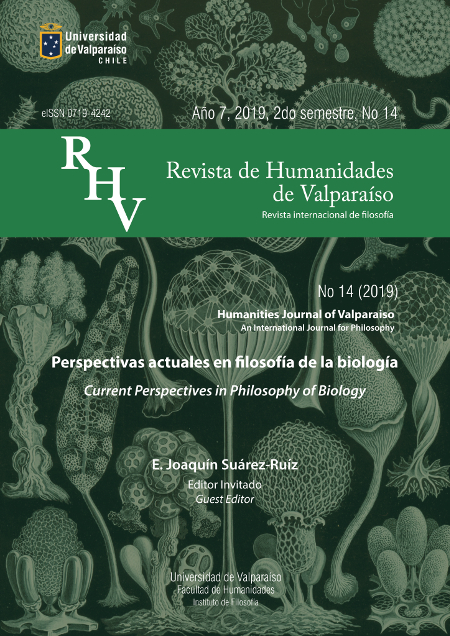El ideal de unificación en biología: el caso de la síntesis evolutiva extendida
DOI:
https://doi.org/10.22370/rhv2019iss14pp275-286Palabras clave:
teoría evolutiva, externalismo/internalismo, perspectiva integradora, continuidad teórica, valor epistémicoResumen
En este artículo analizaré si la denominada Síntesis Evolutiva Extendida (SEE) representa una síntesis y una extensión respecto de su predecesora, la Síntesis Moderna (SM). Se argumentará que la SM propone un enfoque externalista de la evolución en tanto que la SEE considera necesario superar la dicotomía internalismo/externalismo proponiendo enfoques más integradores. Se concluirá que la SEE no puede ser considerada una extensión de la SM y que la apelación a esa extensión se relaciona con aspectos sociológicos y con el valor epistémico de la unificación teórica que siempre estuvo presente en el pensamiento evolutivo biológico.
Descargas
Referencias
Bowler, P. (1985). El eclipse del darwinismo: teorías evolucionistas antidarwinistas en las décadas en torno a 1900. Barcelona: Ed. Labor.
Darwin, C. (1859/1964). On the Origin of Species. A Facsimile of the First Edition. Cambridge: Harvard University Press.
García Azkonobieta, T. (2005). Evolución, desarrollo y (auto)organización. Un estudio sobre los principios filosóficos de la evo-devo. Tesis doctoral. Donostia-San Sebastián: Universidad del País Vasco.
Ghiselin, M. T. (1969). The Triumph of the Darwinian Method. Berkeley: University of California Press.
Gould, S. J. (2004). The Structure of Evolutionary Theory. Massachusetts y Londres: The Belknap Press of Harvard University Press Cambridge.
Huxley, J. (1943). The Modern Synthesis. London: George Allen & Unwin L.T.D.
Kauffman, S. (1993). The origins of order: self-organization and selection in evolution. Oxford: Oxford University Press.
Laland, K. N., Uller, T., Feldman, M. W., Sterelny, K., Müller, G. B., Moczek, A., Jablonka, E., Odling-Smee, J. (2015). The extended evolutionary synthesis: its structure, assumptions and predictions. Proc. R. Soc. B., 282(1813). doi: http://doi.org/10.1098/rspb.2015.1019
Lamarck, J. B. (1809). Philosophie zoologique. Paris: Dentu.
Mayr, E. (2001). The philosophical foundations of darwinism. Proceedings of the American Philosophical Society, 145(4): 488-495.
Mayr, E., Provine W.B (1980). The Evolutionary Synthesis: Perspectives on the Unification of Biology. Cambridge: Cambridge University Press.
Mayr, E. (1998). This Is Biology: The Science of the Living World. Cambridge, MA: Harvard University Press.
Müller, G.B. (2017). Why an extended evolutionary synthesis is necessary? Interface Focus 7: 20170015. doi: http://dx.doi.org/10.1098/rsfs.2017.001
Oyama, S. (2000a). Evolution’s Eye: A Systems View of the Biology-Culture Divide. Durham, NC: Duke University Press.
Oyama, S. (2000b). The Ontogeny of Information: Developmental Systems and Evolution. Durham, NC: Duke University Press.
Oyama, S., Grifiths, P. E., Gray, R. D. (2001). Cycles of Contingency. Developmental Systems and Evolution. Massachusetts: The MIT Press.
Pigliucci, M. (2007). Do We Need an Extended Evolutionary Synthesis? Evolution, 61(12): 2743-2749. doi: https://doi.org/10.1111/j.1558-5646.2007.00246.x
Pigliucci, M., Müller, G. B. (2010). Evolution: The Extended Synthesis. Massachusetts: The MIT Press.
Regner, A. C. (2002). O «jogo do atual e do possível» e as manhas da razão: un estudo de caso. En F. Tula Molina y P. Lorenzano (eds.), Filosofía e historia de la ciencia en el Cono Sur. Quilmes. Argentina: Editorial UNQ.
Ruse, M. (1975). Darwin’s debt to philosophy: An examination of the influence of the philosophical ideas of John. W. Herschel and William Whewell on the development of Charles Darwin’s theory of Evolution. Stud. Hist. Phil. Sci., 6(2): 159-181. doi: https://doi.org/10.1016/0039-3681(75)90019-9
Smocovities, V. B. (1996). Unifying Biology. The Evolutionary Synthesis and Evolutionary Biology. Princeton, New Jersey: Princeton University Press.
Thagard, P. R. (1977). Discussion Darwin and Whewell. Stud. Hist. Phil. Sci., 8(4): 353-356. doi: https://doi.org/10.1016/0039-3681(77)90026-7
Whewel, W. (1837). History of the Inductive Sciences. From the Earliest to the Present Times. London: J. W. Parker.
Whewel, W. (1840). Philosophy of the Inductive Sciences. Founded Upon Their History. London: J. W. Parker.
Descargas
Publicado
Número
Sección
Licencia
Aquellos autores/as que tengan publicaciones con esta revista, aceptan los términos siguientes:
- Los autores/as conservarán sus derechos de autor y garantizarán a la revista el derecho de primera publicación de su obra, el cual estará simultáneamente sujeto a la Licencia de reconocimiento de Creative Commons (CC BY-NC-ND 4.0 International) que permite a terceros compartir la obra siempre que se indique su autor y su primera publicación esta revista.
- Los autores/as podrán adoptar otros acuerdos de licencia no exclusiva de distribución de la versión de la obra publicada (p. ej.: depositarla en un archivo telemático institucional o publicarla en un volumen monográfico) siempre que se indique la publicación inicial en esta revista.
- Se permite y recomienda a los autores/as difundir su obra a través de Internet (p. ej.: en archivos telemáticos institucionales o en su página web) antes y durante el proceso de envío, lo cual puede producir intercambios interesantes y aumentar las citas de la obra publicada. (Véase El efecto del acceso abierto).






